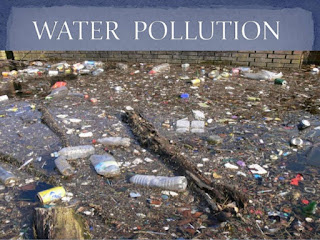Environmental Light Pollution Increases Risk Of Breast And Prostate Cancers
Technology is only good when
it is properly used in a way that it does not ignite an environmental health
issue. The use of modern, super-lit technological equipment is great but when
it threatens our environmental health, it calls for concerned action to limit
its effect on the environment. In both the industrialized and developing
countries, it is becoming very difficult to avoid light pollution even if we
knew about the harmful effects of the environmental exposure to night
light. This unconcerned acceptance to
the impression that, it is after all 'only light', may be the reason for the
increased risk to breast cancer, in women, and prostate cancer in men, in our industrialized
society.
Light pollution has been
identified as as a serious environmental health issue. This has even gained
awareness around the world, leading International Agency for Research on Cancer
(IARC), a branch of the World Health Organization (WHO) to classify light pollution
as a high grade cancer risk among night shift workers. Environmental pollution
specialists have discovered that long exposures to bright night lights tend to
decreases the human body's ability to produce melatonin and sadly enough, this
form of environmental pollution has been linked to high incidences of breast
cancer in women and prostate cancer in men, especially in people in night shift
jobs who are exposed to bright lights. This environmental pollution issue calls
for great concern, because of the facts at hand, especially as it has to do
with breast cancer. Data on cancer shows that after skin cancer, breast cancer
is the most common cancer among women in the US, and it is the second leading cause
of cancer death in women, after lung cancer.
A quick explanation of this
work is necessary. Exposure to bright night light hinders melatonin production by
specialized eye nerve cells (primitive ganglion eye cells) in the photosensitive
retina. These nerve cells have high sensitivity to blue wavelength. In the
instances of night light pollution, these eye nerve cells are triggered to
produce blue light (similar to daytime sky light) which is sent to our brain's Supra
Chiasmatic Nuclei or SCN, a group of brain cells that control our 'biological
clocks'. When this happens, the SCN turns of the pineal gland, a small gland
located in the brain, which also turns of melatonin production. When it is dark
or there is little or no light, the eye nerve cells do not produce blue light
and SCN does not stop melatonin production. Even at weak amounts of night light pollution, melatonin production is suppressed by the pineal gland. Without the
health benefits of melatonin, the activities of other hormonal glands will go
unchecked and this may lead to increased risk of cancer.
A group of researchers lead
by Dr. Fuad Faresand Adina Yokler, Orna Harel and Hagit Schwimmer carried out a study to identify the link between light pollution, decreased melatonin production and increased breast and prostate cancer risk on four groups of lab
mice injected with cancerous cells and exposed to different duration of light
and darkness, and treated with melatonin. Their results showed:
1. A link between light
pollution and cancer
2. The suppression of
melatonin production increased tumor development
3. Melatonin suppression is
associated with to bright night light.
Melatonin, according to research studies, when released in to the body system can both suppress cancer growth and cause death of cancer cells. It also controls the activities of
other hormone-producing glands like the ovaries. It suppresses the activities
of estrogen, progesterone, follicle stimulating hormone (FSH) and luteinizing
hormone (LH). These hormones are know to cause rapid breast cell growth which
may cause error in genetic coding, leading to breast cancer.
Free radicals account for
about 70% of biological damage to DNA proteins and cellular membranes, leading
to production of cancer cells. While most antioxidants can clean up these free radicals,
they do not permanently eradicate them as these free radicals can be released
into the body, recaptured and again, causing more damage. Melatonin oxidizes
and permanently breaks apart these radicals, making sure they are not released
into the body again. A single melatonin molecule has been proven to consume up to 10 free radical molecule species.






Trailer rental Abu Dhabi, UAE We offer private and business clients a scope of top-quality trailers for short or long-haul employ. You can discover whatever trailer you need at truck rental service Dubai uae. Flatbed Trailer Rental Abu Dhabi. Trailer Rental Sharjah & Dubai. Trailer Truck for Rent in UAE Call: 050 651 2943.
ReplyDeleteTrucks &Trailers for rent in Sharjah . Get comfortable trucks, trailers for cheap rent. Flatbed trailer available for rent. We are providing Transportation services with (40ft) long Trailer in Sharjah. Trailer Leasing & Rental Service's In Sharjah UAE.
ReplyDelete